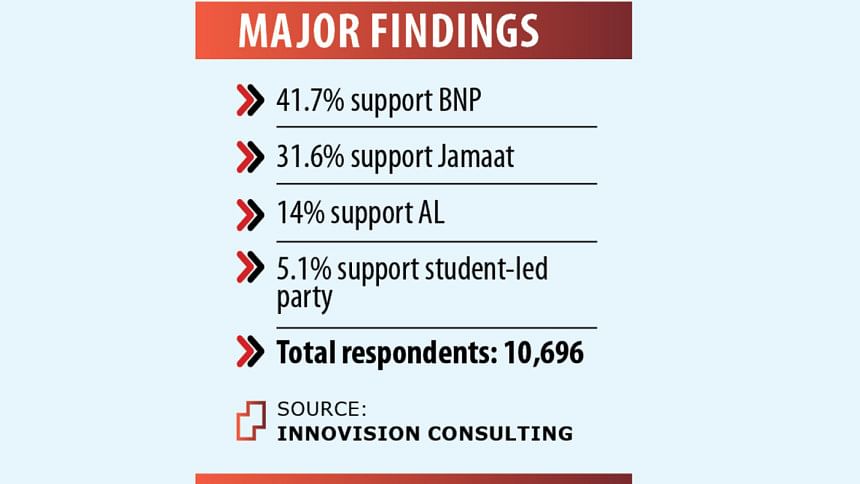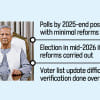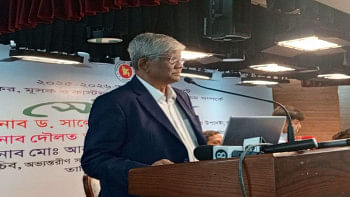58pc want elections to be held this year: survey

Around 58 percent of participants in a recent survey said they want the national elections to be held before the end of this year.
The survey was conducted by Innovision Consulting, an international advisory and management consulting firm, using a random sampling methodology.
The findings were presented at a press conference at The Daily Star Centre in the capital yesterday, with assistance from the citizens' platform Voice for Reform and Bangladesh Research Analysis and Information Network (BRAIN).
Conducted between February 19 and March 3, the survey covered 10,696 individuals across all eight divisions and 64 districts, with 55 percent male and 45 percent female respondents. Meanwhile, 70 percent participants were aged below 45.
According to the study, 31.6 percent want polls by this June and 26.5 percent by December. Meanwhile, 7.9 percent preferred elections in June 2026, while 10.9 percent supported polls after December 2026.
Md Rubaiyath Sarwar, managing director of Innovision Consulting and lead of Bangladesh Speaks, presented the findings, detailing public opinion on the interim government's performance, voter preferences, and future expectations.
The survey found that 62 percent of respondents had already decided on their preferred candidate, with 65.7 percent expressing a clear voting choice.
If elections were held now, BNP would secure 41.7 percent of the vote, followed by Jamaat-e-Islami with 31.6 percent, Awami League with 14.0 percent, and a new student-led political party with 5.1 percent.
Among Gen Z voters (aged 18-28), 35.5 percent showed support for BNP, 34.2 percent for Jamaat, 11.3 percent for Awami League, and 10.1 percent for the student-led party. BNP enjoyed stronger support among Generation X (47 percent) and Boomers (44.7 percent).
The study explored key factors influencing voting decisions. While 21.6 percent cited grassroots politics, 20.5 percent said religion-based politics played a key role. Additionally, 16.4 percent felt ideological alignment with the July Uprising could make the election an ideological contest.
Family influence remained significant, with 47 percent stating household discussions shaped their voting decisions. Social media also played a role, with 18.28 percent citing platforms like Facebook, YouTube, and TikTok as major sources of information.
However, 29.4 percent remained undecided. Among them, 49.3 percent said they needed more information on candidates before deciding, while 33.9 percent were waiting to see how the political situation evolved. Uncertainty was notably higher among Gen Z voters, with 33.6 percent still undecided. Additionally, 33.77 percent of female respondents had yet to make up their minds, compared to 25.81 percent of males.
When asked about priorities for the interim government, 69.6 percent identified controlling price hikes as their top concern, followed by improving law and order (45.2 percent) and job creation (29.1 percent). Additionally, 21.8 percent stressed the need to reduce corruption in public services.
However, widespread dissatisfaction was evident in the survey results. A majority—55.05 percent—believed the interim government had failed to control price hikes, while 42.33 percent thought the issue had only been partially addressed.
Similarly, 58.2 percent felt the government had not met expectations in maintaining law and order, while 40.33 percent said the situation had improved slightly.
Regarding extortion, 41 percent believed incidents had increased, while 29.8 percent thought the problem had decreased, and 17.8 percent saw no change.
Despite discussions on institutional and constitutional reforms, only 9.3 percent of respondents prioritised political reform, and just 5.3 percent demanded constitutional changes.
Fahim Mashroor, CEO of BDJOBS, and Kazi Shahed H. Ferdous, country director of Innovision Consulting Bangladesh, also spoke at the event.

 For all latest news, follow The Daily Star's Google News channel.
For all latest news, follow The Daily Star's Google News channel. 








Comments